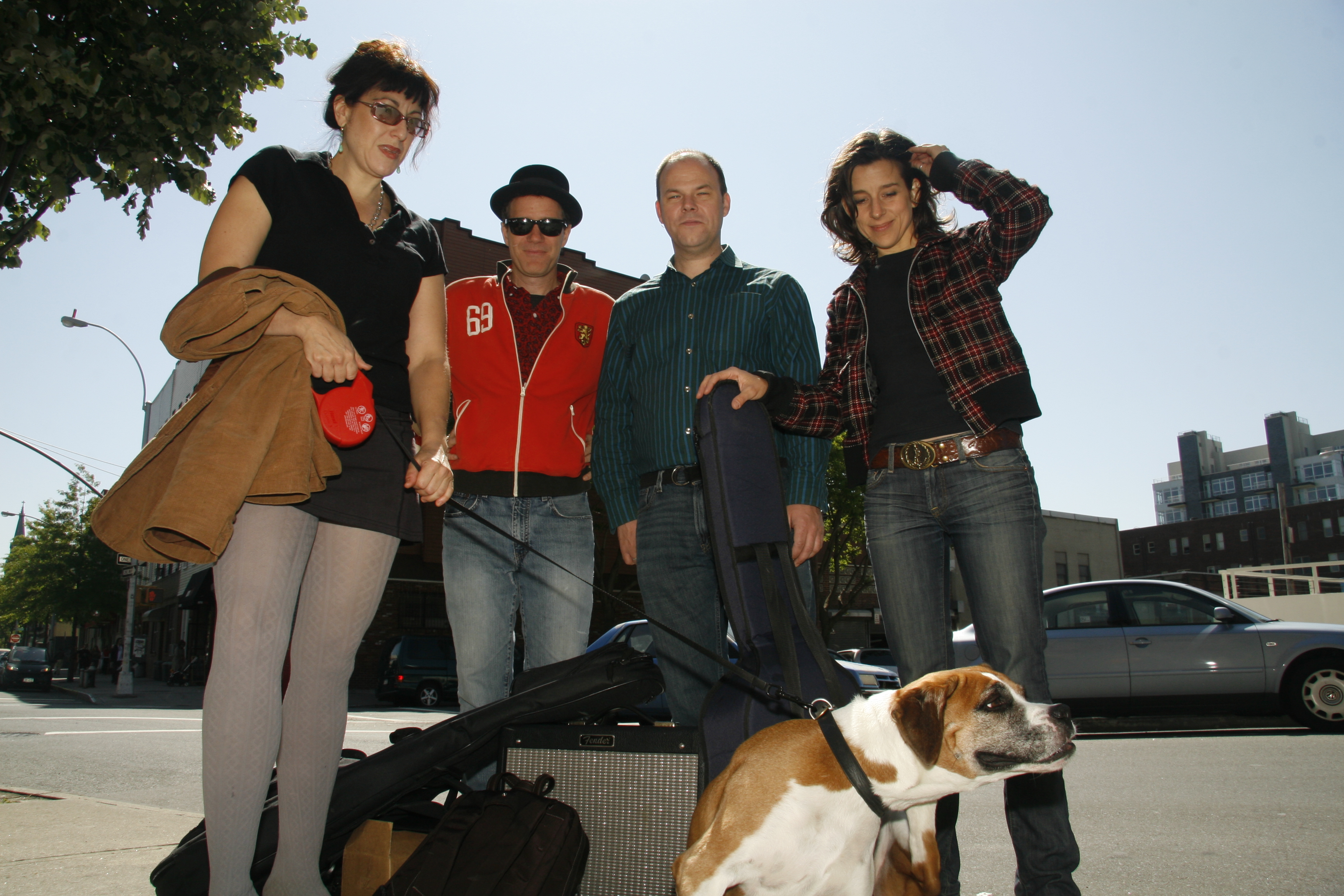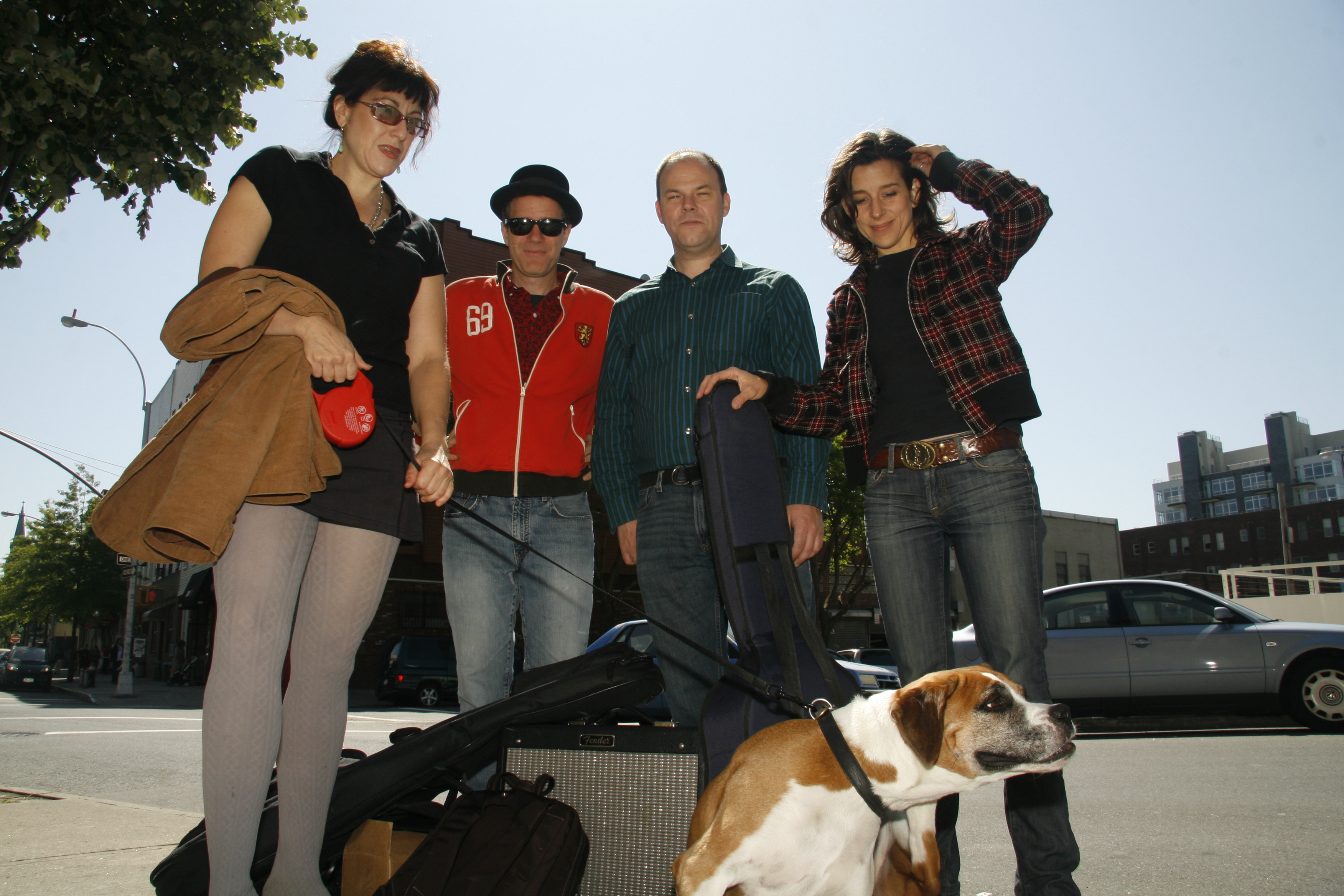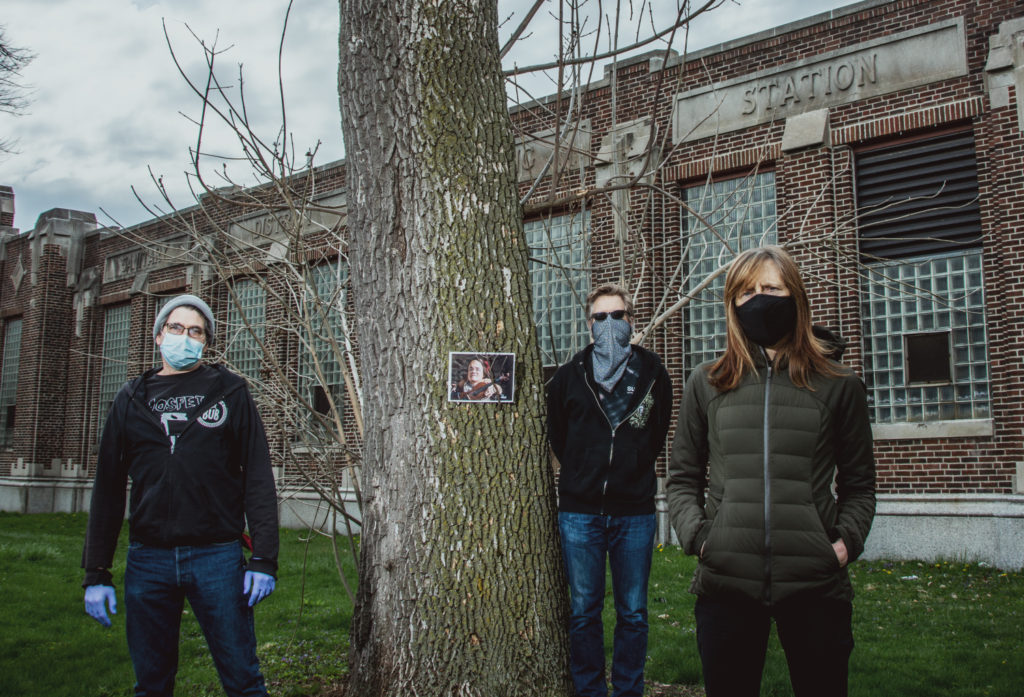Spirit Duplicator, the second record from Brooklyn quartet the Wingdale Community Singers, begins with an enticing simulacrum—not a chord strummed on an acoustic guitar but the naked skeleton of notes that would seem to form that chord. There’s the thrum-thrum of the low E string, followed by hammered-on notes on higher strings, two extremes without the cement between the poles to set them to a fixed place.
“I am nowhere tonight/On the interstate west/Where the sodium lights/Meet the vanishing stars,” singer Hannah Marcus laments as she plucks out the notes. “A whole country out there/Branded with signs/Cut through with roads/And some of them are mine.”
The song, however, is anything but fragile, instead developing into a kind of verbal confrontation between David Grubbs’s crunching electric guitar and the honey-sweet vocal harmonies of Marcus, Nina Katchadourian, and Rick Moody.
As Marcus continues, Katchadourian and Moody interject their own backing narratives. Then, over Grubbs’s guitar and a simple line played by drummer Charles Burst, they all join in together: “I’m in the mood to drive/Get in the car and drive/I’m in the mood to drive.” The moment defines a modus operandi: Welcome to your escape.
Moody and Marcus formed the Wingdale Community Singers eight years ago as an exercise in pre-rock Old Time music. But Moody, an author by trade, undermined the wholesomeness of the group’s image by christening them with a name referencing a New York psychiatric hospital. Grubbs, a seasoned avant-rock musician and Brooklyn College professor, joined the Wingdales around 2003, and the trio released its self-titled debut on Plain Recordings shortly thereafter. Katchadourian, a visual artist and singer-songwriter in her own right, joined in 2006, and Spirit Duplicator was released on Scarlet Shame Records last October.
The Wingdale Community Singers’ eponymous debut seemed to take pride in its eclectic borders. It was heartbreaking (“Bigger Ocean”) but rambunctious (“Fishnet Stockings”), reverent (“Holy Virgin Star”) but also playful (“Dirty Little Dog”). The record had a stand-out single that never was (the beautiful “Blue Daisy”), and a killer closing track (the elegiac “Indira’s Lost and Found”)—in which Moody’s breathy singing over an emotive piano figure could be interpreted as either a parent watching a child grow up and move out on her own or a parent lamenting a child whose life was taken too soon. Devastating stuff. This wasn’t quite folk, but something more like “urban country,” a tag that critics tossed around.
Despite how well the trio collaborated—their harmonies can literally summon chills—it was still possible to pick out the individual contributions, like Grubbs’s glassy post-rock guitar playing or, on the guitar squalor that opens “Dog In Winter,” hints of Godspeed You! Black Emperor, a band that Marcus has worked with.
On Spirit Duplicator, the Wingdale Community Singers have become, in a sense, more communal. Sometimes it’s tough to tell who is and isn’t singing, or whose guitar has taken center stage, without consulting the liner notes. The record has more than its fair share of memory-burning songs—“I’m in the Mood (To Drive),” “Pofilia,” “My Les Paul,” the Django-jazziness of “Rancho de la Muerta,” the upbeat a cappella tune “On the Carousel,” to name a few—but the whole thing feels more like a collaboration than a group of musicians playing each other’s tunes. Leading into the album-closing “Death Is Only a Dream,” the song “The Sleepers on the Block” ends with a simple line that, repeated by the whole group over slide guitar and slowly climaxing percussion, turns into an incantation: “Make this chilly bedroom warm.”
“[Spirit Duplicator] is a lot different in terms of the songwriting,” said Moody, who moved to Prospect Heights, Brooklyn, from Hoboken 18 years ago. “There’s a lot of growth, I think, and the arrangements are much more sophisticated. We took more time and were more confident. But I think it’s evidently the same band, in that there is still a lot of pre-rock music undergirding the whole.”
The Wingdales are, of course, subject to the kinds of gossip that accompany any band with “names” attached to it. There are stories of reckless touring, the group’s devotion to Scientology, the intra-band marriages and resulting intra-band divorces. And is there any truth to the rumor that they had a song chosen as the American entry in a Eurovision contest? The group is happy to leave that mystery unresolved.
Right now, what seems to be on their mind most is a third album. Each member has different answers about how close that record is to fruition, but demos are beginning to surface. On one, provided by Moody, the band sounds in top form, wandering through a vocal and acoustic-guitar maze titled “So What.”
The track begins with Marcus singing, over quiet acoustic guitar, about a group having a great friend they’ve just lost. “And I realized that everything, everything is just how you decide it,” she sings over what sounds like a muted trumpet or saxophone. Two minutes in, the piece suddenly shifts, with multiple vocal melodies and, eventually, a poppy, even Beatlesque bridge giving way to a choir of unaccompanied voices singing repeatedly, “So what?” The piece ends in full band mode, with Marcus hitting falsetto notes over a powerful backbeat. This new recording shows a melodic expansiveness only hinted at on the Wingdales’ earlier work.
But when can listeners expect the new record?
“I’d guess that two-thirds of [the third record] is written, but we want to have the whole enchilada more than ready before even talking about [going into] the studio,” said Grubbs, who lives in Clinton Hill.
In the best Old Time tradition, the Wingdale Community Singers write about what’s around them—people and places of New York City, bike-shop boys and Korean groceries and a bar called Doc’s where you can weep over a shot of tequila. But occasionally, they drop references that could be read autobiographically.
On The Wingdale Community Singers, it was a contribution from Grubbs that stood out for what it said (or didn’t say) about the singer-songwriter himself. That song was “Family Plot, Mayfield Kentucky,” a track with a guitar line as haunted as that cemetery at midnight. “The statues defend the dead from our kind,” Grubbs sings. “Shield the dust, the harmless dust/From anguish, grief, inhumanity.” The song could have come right off Grubbs’s solo record A Guess at the Riddle. But it ultimately reveals little—and besides, Grubbs was born and bred in Louisville, Kentucky, not Mayfield.
A similar claim could be made for Marcus, who lives in East Williamsburg, and the song “Montreal,” from Spirit Duplicator.
“My earliest musical memory—I shit you not—is a dream I had when I was five, where the bust of Beethoven popped up in a coffin and sang me a song with the lyrics, ‘A kiss on the lips and I die if I will,’” she said. “It had a very particular melody, which I remembered and mined for a song called ‘Vampire Snowman,’ which I recorded with Mark Kozelek [of Red House Painters and Sun Kil Moon] in 1991. Some people from Godspeed You! Black Emperor were apparently listening to that recording in their van on tour in Germany somewhere and decided to ask me to join them on a leg of the tour. I’ve since made two albums with folks from that band at their recording studio in Montreal.”
“A sewage plant that’s always spewing/Just ten blocks from this park bench/Some nights it smells like cherry candy/Just to cover up the stench,” Marcus sings on the track, over piano and Tianna Kennedy’s cello. “But Montreal is so much cleaner/People take care of their trash/And the rent is so much cheaper/You get more for your cash.”
It’s so tender and caring that it could be a love song, and the Wingdale Community Singers flesh out the proceedings with three vocal narratives; only Grubbs is absent.
But is it autobiography?
“My songwriting is basically all autobiographical, because I don’t have the discipline to keep myself out of the picture,” Marcus said. “[But] ‘Montreal,’ for instance, is actually primarily inspired by a friend of mine who moved to Montreal for a while. She’s back now, by the way.”
Maybe the sense of mystery and intrigue the band creates, after all, is more enticing than the truths they seek to report, much as it’s more inviting to introduce your newest record with a phantom chord than one that’s easily strummed. – Brooklyn Rail, May 2010





